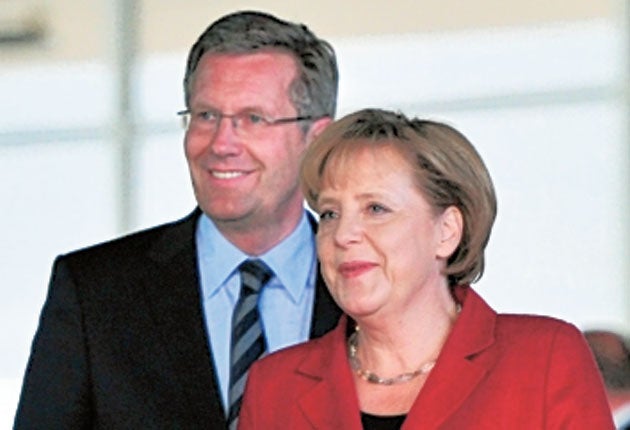Merkel backs down on female president after rebellion

Chancellor Angela Merkel has nominated Christian Wulff as her choice for Germany's next president after being forced to drop plans to give the post to a woman in the face of strong opposition from the right flank of her party.
She said she was sure the 50-year-old moderate conservative Prime Minister of Lower Saxony, who was once considered her potential successor, would make "a wonderful president".
Ms Merkel had earlier indicated that Ursula von der Leyen, her popular conservative Employment Minister, was her preferred candidate. But she was obliged to change her mind after Catholic right-wingers within her Christian Democratic party reportedly opposed the idea of "two Protestant women running the country". Ms Merkel and Ms von der Leyen are also seen to have shifted the party to the left by implementing more liberal policies.
The change of candidates was interpreted as a blow to Ms Merkel's diminishing standing within her party and in Germany as a whole because of what many have perceived as her inept handling of the euro crisis. The Christian Democrats were also defeated in a key state election last month, and recent polls put the Chancellor's popularity at a four-year low.
Mr Wulff is seen as a compromise candidate who could appeal to most Chrsitian Democrats. Yet he once admitted he did not have " enough desire for power" ever to become chancellor. He was described by the Financial Times Deutschland yesterday as "Christian Who?". The paper said his candidacy was "sad evidence of how little room to manoeuvre Merkel now has in her own party".
Germany's presidential election, necessitated by Monday's sudden resignation of President Horst Köhler, is due at the end of this month. Mr Köhler stepped down after criticism of comments he made about German troops in Afghanistsan, which implied that they were there to protect Berlin's trade routes.
Germany's opposition, the Social Democrat and Green alliance, have agreed to field Joachim Gauck, 70, a former East German dissident and head of their Stasi secret police archive set up after red-unification.
Although a widely respected figure, Mr Gauck is not expected to be voted in because Mr Wulff's conservative backers hold a majority in Germany's Federal Assembly, the MPs and federal state delegates who elect the president.
Join our commenting forum
Join thought-provoking conversations, follow other Independent readers and see their replies
Comments
Bookmark popover
Removed from bookmarks